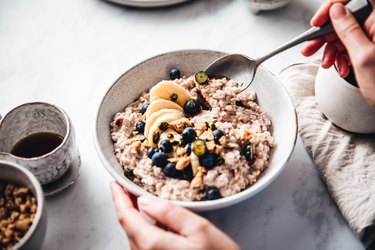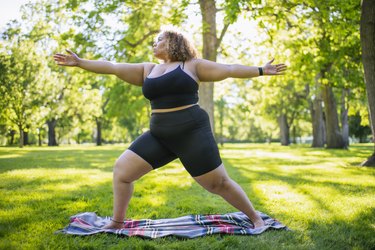
Inflammation is sometimes a misunderstood process in the body. For instance, not all inflammation is bad, says Nicole Cotter, MD, rheumatologist with UCHealth Rheumatology Clinic in Steamboat Springs.
"Inflammation is the body's response to injury and it's a necessary and protective response," Dr. Cotter notes. "For example, the inflammation the body creates in response to an infection can be life-saving."
Video of the Day
Video of the Day
However, if inflammation becomes chronic and uncontrolled, it can be dangerous. Chronic inflammation can damage tissues and constant, low levels of inflammation are thought to be responsible for many chronic illnesses, such as heart disease and diabetes, she notes.
For some people with inflammatory diseases, such as rheumatoid arthritis, inflammation will need to be managed medically. But everyone can take steps to reduce unnecessary chronic inflammation in their body.
Here are the best, doctor-approved ways to reduce inflammation in the body, and to keep it from becoming a long-term condition.
1. Eat Anti-Inflammatory Foods
Add or ramp up certain foods in your diet to lower overall inflammation.
Diet is so important as a means of reducing inflammation that it's even been studied as a way to manage chronic inflammatory diseases, such as rheumatoid arthritis, according to an April 2018 article in Nutrition Journal.
The best foods for reducing inflammation are whole and plant-based fare, including:
- Dark leafy greens, like spinach and kale
- Cruciferous vegetables, such as broccoli and Brussels sprouts
- Berries
- Omega-3-rich fatty fish, such as salmon
- Olive oil
- Whole grains like brown rice and oatmeal
- Spices such as turmeric, cumin, cinnamon, basil and parsley
- Ginger
- Dark chocolate
- Green tea
2. Limit or Avoid Inflammatory Foods
Just like some foods can quell inflammation, others can stoke the fires.
Certain foods will be inflammatory in only some people, Dr. Cotter says, depending on how your body reacts to them (if you had a food intolerance, for example).
But there are also universal inflammatory food items, including:
- Sugar
- Refined carbohydrates, such as white bread, pasta or pastries
- Processed foods (think: packaged foods with long lists of ingredients)
- Refined cooking oils, like canola and vegetable oils
3. Feed Your Microbiome

According to a November 2020 study in the British Journal of Nutrition, dietary nutrition has a direct affect on overall inflammation as well as gut health in the body.
More specifically, eating anti-inflammatory foods better supports a healthy microbiome of diverse, beneficial bacteria. For instance, the study found that people who followed the most anti-inflammatory diet had higher levels of Akkermansia muciniphila, which is a beneficial gut bacteria associated with helping decrease obesity, untreated type 2 diabetes and hypertension, per a July 2019 study in Nature Medicine.
To support gut health and overall lower levels of inflammation, focus on eating both probiotics and prebiotics to support the microbiome and overall gut health.
Prebiotics can be found in:
- Alliums (leeks, garlic and onions)
- Fruits like apples, bananas and berries
- Ground-up flaxseeds
- Honey
- Vegetables like asparagus, artichoke and other green veggies
- Whole grains such as oats, whole wheat and barley
4. Pay Attention to How Food Makes You Feel
Outside of blatant inflammatory foods, Dr. Cotter points out that food sensitivities are very individual. Some food items, such as gluten or lactose, may cause inflammation in you, but not in other people.
"The best way to identify what works for you is to pay attention to your body," she suggests. "Notice what gives you energy and what makes you feel poorly," meaning tired, bloated or achy.
And while you might be tempted to try at-home food sensitivity tests that promise to help you identify foods that are causing inflammation in your body, Dr. Alejandro Junger, MD, an LA-based cardiologist, founder and medical director of the Clean Program, and author of Clean and Clean 7, cautions against them. "They are overused and misinterpreted, and they only serve those who happen to use them correctly," he says.
Instead, he recommends trying a specific food elimination diet by cutting out potential inflammatory foods — such as gluten, dairy and caffeine — for a minimum of two weeks, then reintroducing foods one by one to see how your body reacts.
Here's everything you need to know to try an elimination diet.
5. Reduce Stress

Stress is inflammatory, so managing stress is important in managing inflammation, Dr. Cotter tells LIVESTRONG.
An April 2012 article in the Proceedings of the National Academy of Sciences explains that stress lowers the body's ability to regulate the inflammatory response back down. In other words, if you have chronic stress, your body runs the risk of being in a constant state of inflammation because it thinks it's in danger.
The study found that people with chronic stress who were then exposed to a rhinovirus (the common cold virus), were more likely to develop a cold than people who did not have chronic stress.
To combat the effects of stress, Dr. Cotter recommends calming practices such as mindfulness, meditation or yoga.
"A lot of the stress-related, inflammation-related chemicals and signals — like CRP and cortisol — in our bodies go down when we do these activities," adds Erin R. McNeely, MD, division chief for primary care for Grand Rapids Region Spectrum Health, West Michigan.
6. Exercise Daily
A daily exercise routine can help reduce inflammation in as little as two weeks, according to an older but still widely cited study in the American Journal of Lifestyle Medicine.
So, how much should you be doing? The Physical Activity Guidelines for Americans recommend adults get at least 150 minutes of aerobic exercise each week, along with at least two strength-training sessions.
"For a busy person, that can mean micro walks around the block between meetings and 10 to 15 minutes of body-weight training in the morning," Dr. McNeely says. "It doesn't have to be an elaborate set-up. "
As far as choosing the right exercise for you? "They say that the best exercise is the kind you will do," Dr. Cotter says. "Even moderate exercise, such as 20 minutes of walking, can have an anti-inflammatory effect."
Related Reading
7. Just Stand Up
If you're someone who sits a lot for work, Dr. McNeely says one of the simplest things you can do to help reduce inflammation is make sure you get up every two to three hours.
"It's really helpful and staves off what we call 'resting physiology,' which should really be reserved for nighttime and sleep," she explains.
Set a "stretch break" alert in your phone every couple of hours during the workday, or invest in a standing desk, such as the Vari Electric Standing Desk ($595, Amazon.com).
8. Get at Least 7 Hours of Sleep

You knew it was coming, but it's here because it's an important one. It's been confirmed by multiple studies that lack of sufficient sleep is associated with higher levels of inflammation in the body.
To keep inflammation at bay, aim for at least seven hours of sleep to avoid increasing inflammation, says Dr. McNeely, and keep in mind that your sleep needs may be even higher. The National Sleep Foundation recommends adults get seven to nine hours of shut=eye each night.
And if you're someone who is sleep-deprived for reasons outside of your control — like night-shift workers or new parents — not all hope is lost.
A September 2019 study in the British Medical Journal found that napping was associated with fewer cardiovascular events, suggesting that there may be some sort of protective mechanism to catching up on missed sleep with daytime naps. However, as with all things, moderation is key: Excessive amounts of daytime naps are also linked to higher levels of inflammation, according to Sleep Medicine.
Related Reading
9. Quit Smoking
Dr. Cotter recommends taking steps to avoid harmful chemicals in your environment, and that includes quitting smoking or vaping if you partake.
Similarly, if you live or often spend time with a smoker, it's in your best interest to support them in quitting, to reduce your exposure to secondhand smoke.
The Bottom Line
If you're concerned about inflammation, focus on eating plenty of whole foods, exercising regularly, reducing your stress and getting enough sleep as often as you can.
And if you have any type of chronic disorder, be sure to work with your doctor for any additional steps — including medication — that you can take to manage your inflammation.
- American Journal of Lifestyle Medicine: “The Anti-Inflammatory Actions of Exercise Training”
- British Medical Journal: "Association of napping with incident cardiovascular events in a prospective cohort study"
- Sleep: "Sleep Duration Trajectories and Systemic Inflammation in Young Adults: Results From the National Longitudinal Study of Adolescent to Adult Health (Add Health)"
- Nutrition Journal: “A randomized controlled cross-over trial investigating the effect of anti-inflammatory diet on disease activity and quality of life in rheumatoid arthritis: the Anti-inflammatory Diet In Rheumatoid Arthritis (ADIRA) study protocol”
- Sleep Medicine: "The interactive effects of nocturnal sleep and daytime naps in relation to serum C-Reactive protein"
- British Journal of Nutrition: “Dietary inflammatory potential in relation to the gut microbiome: results from a cross-sectional study”
- Nature Medicine: "Supplementation with Akkermansia muciniphila in overweight and obese human volunteers: a proof-of-concept exploratory study"
- Proceedings of the National Academy of Sciences: “Chronic stress, glucocorticoid receptor resistance, inflammation, and disease risk”
- Journal of Inflammation Research: “High-intensity interval training induces a modest systemic inflammatory response in active, young men”
- Physical Activity Guidelines for Americans, 2nd Edition
- National Sleep Foundation: "How Much Sleep Do You Really Need?"
Is this an emergency? If you are experiencing serious medical symptoms, please see the National Library of Medicine’s list of signs you need emergency medical attention or call 911.


